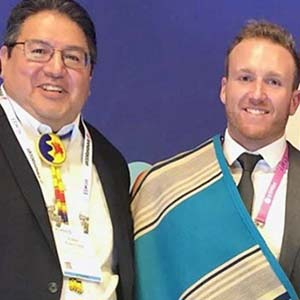
Evan Dunne, a 2017 graduate of George Mason University’s Schar School of Policy and Government, has taken his academic foundation and built a career that’s not only influencing policy but also reshaping how tribal health is approached across the country.
His degree in government and international politics, Dunne said, gave him a behind-the-scenes understanding of the intricate mechanics of politics, where coalition-building and data reign supreme.
This “inside baseball” insight, he said, helped Dunne carve out a unique role at HIMSS, a global advisor, thought leader, and member-based health information technology nonprofit. It was there that he helped launched the first-ever HIMSS Native American and Indigenous Community, a platform he designed to unite tribal members, allies, and experts in culturally sensitive policy discussions, strategic planning, and the promotion of cutting-edge health technology best practices for tribal health.
In March 2024, Dunne took the initiative further by hosting the inaugural Native American Health IT Symposium at HIMSS’s global conference, an event attended by more than 30,000 people. U.S. Rep. Sharice Davids (D-KS), one of the first Native American women elected to Congress, sent a video message lauding HIMSS’s efforts to bridge the gap between federal and tribal health innovation.
“My job,” Dunne said, “is to analyze policies at every level—federal, state, local—and also to manage our grassroots HIMSS Chapter Advocacy program.” He organizes and trains chapter leaders to advocate for health equity and align with HIMSS’s public policy goals, all while staying focused on elevating the health needs of Native communities.
Dunne’s passion for service drives his work, and he said he feels “most authentically” himself when working to improve the lives of others. That drive was what sparked the creation of HIMSS’s Native American and Indigenous Community. When longtime HIMSS members identified the glaring absence of a space dedicated to Native voices, Dunne took action, determined to fill the gap and create a lasting impact.
Reflecting on his journey, Dunne credits his Schar School education not just for the political know-how, but for the network of ambitious peers who helped sharpen his focus. His Capitol Hill experience, coupled with his passion for health, has allowed him to be a catalyst for change by advocating for health equity frameworks through policy and technology.
